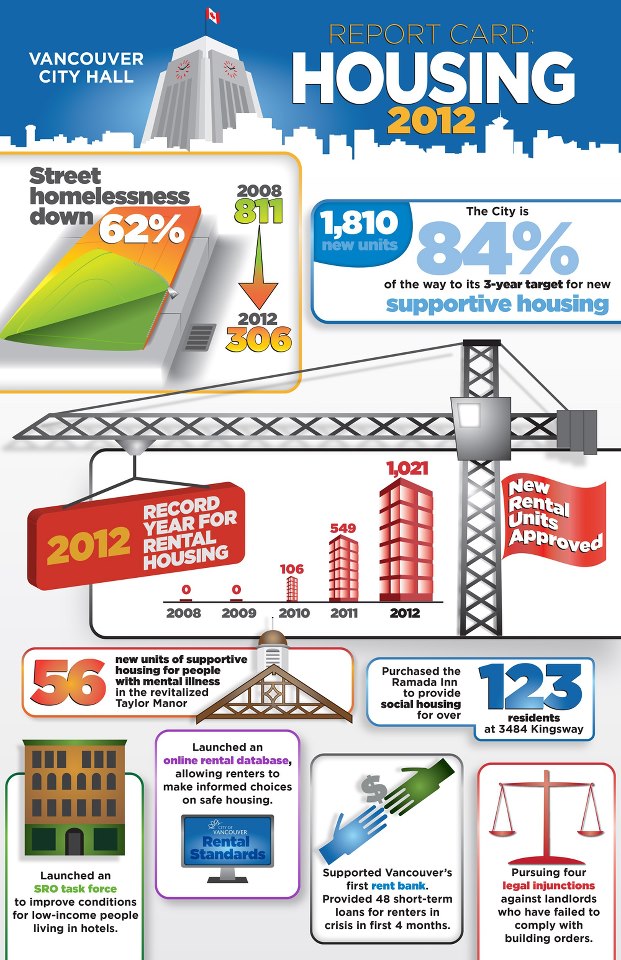
The 2012 report card on the City’s Housing and Homelessness strategy shows Vancouver is currently exceeding all of its short-term targets for protecting and expanding affordable rental housing, building new supportive housing, and ending street homelessness.
The targets are part of a ten-year Affordable Housing and Homelessness Strategy approved by City Council in 2011.
Vancouver has already met and exceeded its 2015 target for new secured rental housing, achieved 84% of the 2015 goal for new supportive housing units, and is on track to meet or exceed the 2015 targets for new secondary rental units and new social housing. Street homelessness is also down 62% since 2008, from 811 individuals to 306 in 2012.
“There’s much more work to do, but it’s encouraging to see such tremendous progress on the City’s work to build new supportive housing, end street homelessness, and support Vancouver renters,” said Mayor Gregor Robertson.
“Vancouver’s Housing and Homelessness strategy is a clear plan with the open reporting and metrics we need to track our progress. This 2012 report card shows that we are meeting or exceeding the targets we established for our work to end street homelessness by 2015 and to make Vancouver a more affordable and livable city for everyone.”
The report presented at Council today also provided an update on the first few months of operation for the Vancouver rent bank, which prevents evictions and homelessness by providing small, timely loans to low-income renters in crisis.
As of the end of January 2013, the Rent Bank had received 59 applications and provided 48 loans. It opened in October 2012.
“Many renters are put at risk of homelessness due to high rents and a vacancy rate of just 1.1%, leading to situations when an unexpected expense or hardship can force individuals or families on to the streets,” added the Mayor. “It’s great to see that the Rent Bank is working to help vulnerable Vancouver residents regain their financial footing so they can continue to contribute to our community and local economy.”
In addition to new supportive housing and homelessness initiatives, the City of Vancouver has taken a number of steps to make housing more affordable and provide support for renters. These include:
- Launching a Mayor’s Task Force on Housing Affordability
- Approving the development of an arms-length Affordable Housing Authority
- Offering six sites of city-owned land for lease to non-profits for affordable rental housing
- The opening of Vancouver’s first Rent Bank, to support renters in crisis with short-term loans
- The creation of the Rental 100 Program, which provides incentives for the development of new, 100% rental buildings
- The development of an online Rental Standards Database, which will enable renters to search out buildings that have current safety issues
- Hosting the international ideas competition re:THINK Housing, to solicit ideas from around the world on how to create new affordable housing
Vancouver Housing Report infographic
Main image by AloneAlbatross


